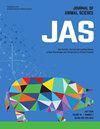338 Classroom mental wellness exercise improves wellness domains
IF 2.7
2区 农林科学
Q1 AGRICULTURE, DAIRY & ANIMAL SCIENCE
引用次数: 0
Abstract
Poor mental health is a rising problem in undergraduate students, with anxiety and depression leading mental health issues. Insufficient or low physical activity, social isolation, and loneliness are among risk factors that predict mental health issues. Increased demand for already limited mental health resources such as counseling, combined with the stigma surrounding mental health has led to many issues going untreated. Mental health can be comprised of several domains such as academic, physical, emotional, financial, occupational, and stage of life. Improving individual domains will improve overall mental wellness. The objective of this study was to improve mental wellness in individual domains by discussing mental health and encouraging undergraduate students to reduce predictive factors and specifically focus on self-selected wellness domains. Following a 60-min classroom discussion in an animal science course on the prevalence of mental health issues and the common wellness domains (Academic, Emotional, Financial, Interpersonal, Occupational, Physical, and Stage of Life) students (n = 24) rated their current feeling of wellness in each domain on a Likert-scale of 0 (totally lacking) to 6 (completely fulfilled) in an anonymous Qualtrics survey. Strategies on improving the different wellness domains were then discussed, and students were placed into groups based on common domains they would like to improve, and the groups helped individual members identify semester personal goals. A class-wide social media group was formed, and students were given bonus points for posting pictures and texts of progression towards their goals. To encourage participation and support from group members, groups were awarded additional bonus points for having the greatest member activity. After 12 wk, students were given a post-course survey to rate their wellness domain fulfillments, as well as report the amount of time dedicated to improving the specific domains. Pre-and post-course wellness fulfillment ratings were compared using the Mann-Whitney-U Test in SPSS, and Spearman’s rho was used to determine correlations between post-fulfillment ratings and time dedicated to each domain. Fulfillment of Emotional and Physical increased following the exercise (P ≤ 0.016), and Academic tended to increase (P = 0.079). Time spent fulfilling a specific domain was positively correlated with the respective domain for Academic (P = 0.003), Emotional (P < 0.001), Interpersonal (P = 0.006), Physical (P < 0.001), and Stage of Life (P < 0.001) and tended to be positively correlated (P = 0.084) for Occupational. There was no correlation between time spent fulfilling the Financial domain and Financial fulfillment score (P = 0.183). Employing open classroom discussions about mental health and encouraging students to become proactive in their strategies for improving specific mental wellness domains increases their feelings of fulfillment in those domains.338 课堂心理健康锻炼可改善健康领域
心理健康状况不佳是大学生中一个日益严重的问题,焦虑和抑郁是主要的心理健康问题。体育锻炼不足或很少、社会隔离和孤独感都是预示心理健康问题的风险因素。对心理咨询等本已有限的心理健康资源的需求增加,再加上围绕心理健康的耻辱感,导致许多问题得不到治疗。心理健康可由多个领域组成,如学业、身体、情感、财务、职业和生活阶段。改善各个领域将提高整体的心理健康水平。本研究的目的是通过讨论心理健康问题,鼓励本科生减少预测因素,并特别关注自我选择的健康领域,从而提高各个领域的心理健康水平。在动物科学课程中,学生们(n = 24)就心理健康问题的普遍性和常见的健康领域(学业、情感、财务、人际、职业、身体和生活阶段)进行了 60 分钟的课堂讨论,之后在匿名的 Qualtrics 调查中,学生们按照 0(完全缺乏)到 6(完全满足)的李克量表,对自己目前在各个领域的健康感觉进行了评分。然后讨论了改善不同健康领域的策略,并根据学生希望改善的共同领域将他们分成小组,小组帮助每个成员确定学期个人目标。还成立了一个全班范围的社交媒体小组,学生在小组内发布实现目标的图片和文字可获得奖励积分。为了鼓励小组成员的参与和支持,小组成员活跃度最高的小组可获得额外奖励分。12 周后,学生们接受了一项课程后调查,对其健康领域的成就进行评分,并报告为改善特定领域所投入的时间。使用 SPSS 中的 Mann-Whitney-U 检验比较了课程前后的健康成就感评分,并使用 Spearman's rho 来确定课程后的成就感评分与投入到每个领域的时间之间的相关性。运动后,情感和身体方面的满足感增加了(P ≤ 0.016),学术方面的满足感也有增加的趋势(P = 0.079)。在学业(P = 0.003)、情感(P < 0.001)、人际(P = 0.006)、身体(P < 0.001)和生活阶段(P < 0.001)方面,用于满足特定领域的时间与相应领域呈正相关,而在职业方面则趋于正相关(P = 0.084)。在财务领域花费的时间与财务成就感得分之间没有相关性(P = 0.183)。在课堂上公开讨论心理健康问题,鼓励学生积极主动地制定改善特定心理健康领域的策略,可以提高他们在这些领域的成就感。
本文章由计算机程序翻译,如有差异,请以英文原文为准。
求助全文
约1分钟内获得全文
求助全文
来源期刊

Journal of animal science
农林科学-奶制品与动物科学
CiteScore
4.80
自引率
12.10%
发文量
1589
审稿时长
3 months
期刊介绍:
The Journal of Animal Science (JAS) is the premier journal for animal science and serves as the leading source of new knowledge and perspective in this area. JAS publishes more than 500 fully reviewed research articles, invited reviews, technical notes, and letters to the editor each year.
Articles published in JAS encompass a broad range of research topics in animal production and fundamental aspects of genetics, nutrition, physiology, and preparation and utilization of animal products. Articles typically report research with beef cattle, companion animals, goats, horses, pigs, and sheep; however, studies involving other farm animals, aquatic and wildlife species, and laboratory animal species that address fundamental questions related to livestock and companion animal biology will be considered for publication.
 求助内容:
求助内容: 应助结果提醒方式:
应助结果提醒方式:


